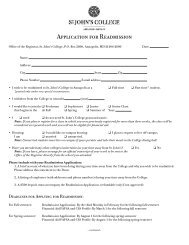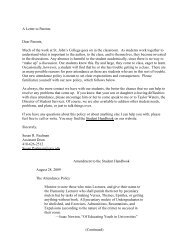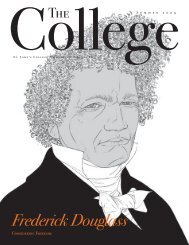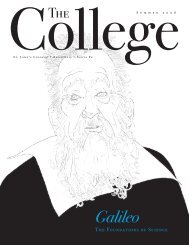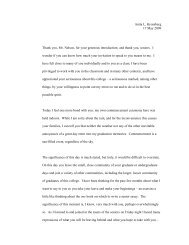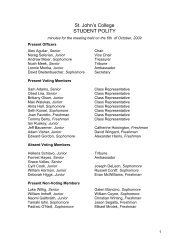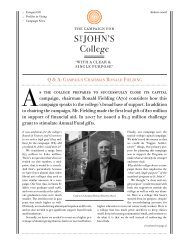âTo Meet with Macbeth,â given by tutor Louis ... - St. John's College
âTo Meet with Macbeth,â given by tutor Louis ... - St. John's College
âTo Meet with Macbeth,â given by tutor Louis ... - St. John's College
You also want an ePaper? Increase the reach of your titles
YUMPU automatically turns print PDFs into web optimized ePapers that Google loves.
First, Birnam Wood comes to Dunsinane in the cut boughs carried <strong>by</strong> the soldiers. <strong>Macbeth</strong>,<br />
hearing the report, begins “To doubt th’ equivocation of the fiend” (V.v.43). The words of promise on<br />
which the highest hopes of mankind are founded are essentially double: equivocal if the fiend “lies like<br />
truth” (44), or poetic if the prophet, poet, or philosopher tells truth like a lie. The wood of Birnam<br />
moves to signify that words do not stay still in one fixed meaning, though they are grounded in<br />
something not of woman born, for words are not of human origin and manipulation only. Seyton speaks<br />
doubly to <strong>Macbeth</strong>, telling him the form of his own tale (the five act structure of the stage play) and the<br />
truth of its content (the meaning of each act). You have to live at peace <strong>with</strong> doubleness to hear Seyton<br />
properly and more so the Weird Sisters. <strong>Macbeth</strong> does not live at peace that way. Shakespeare revels<br />
in the double quality of dramatic speech as partaking of both art and nature. The drums, owls, crickets,<br />
bells, and thunder remind us continually that words are both signs and sounds, and sounds speak<br />
powerfully <strong>with</strong>out logos to embodied souls that move, breathe, and have (even when old) “so much<br />
blood in them” (V.i.43).<br />
Next, the soldiers throw down their “leafy screens” and show their separate faces (V.vi.1).<br />
<strong>Macbeth</strong>, like a bear tied to the stake, prepares to kill every last one of them that comes <strong>with</strong>in his<br />
reach. The succession of “tomorrows” is time enough for that. Enter <strong>with</strong>in reach the young Siward,<br />
son of an old professional soldier of whom “Christendom” affords none better (IV.iii.192). We hear from<br />
Young Siward something we have heard before:<br />
Young Siward.<br />
What is thy name?<br />
<strong>Macbeth</strong>.<br />
Thou’lt be afraid to hear it.<br />
Young Siward.<br />
No; though thou call’st thyself a hotter name<br />
Than any is in hell.<br />
<strong>Macbeth</strong>.<br />
My name’s <strong>Macbeth</strong>.<br />
Young Siward.<br />
The devil himself could not pronounce a title<br />
51






